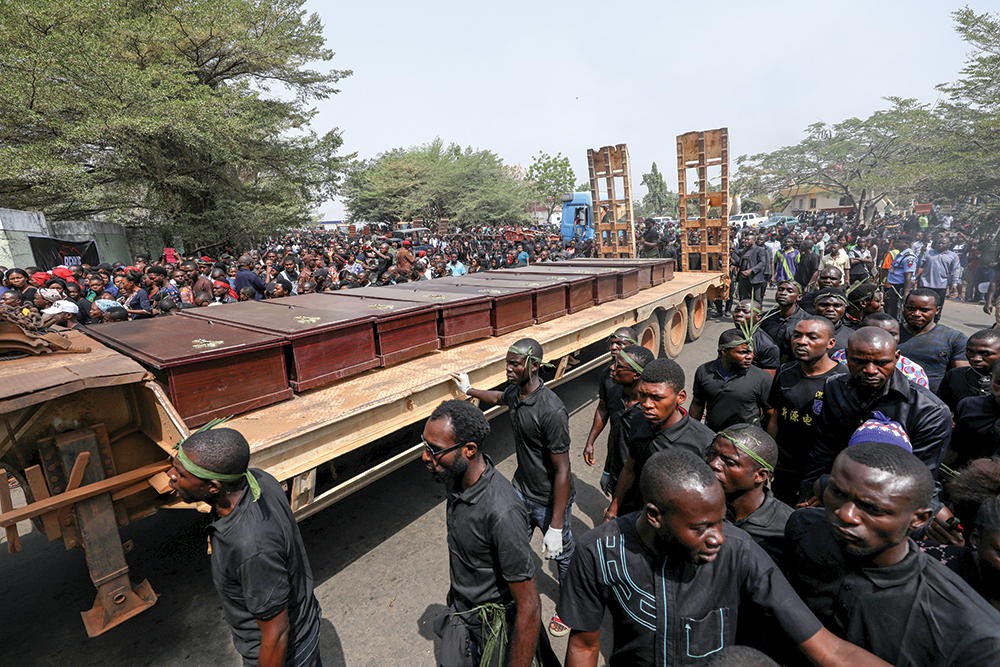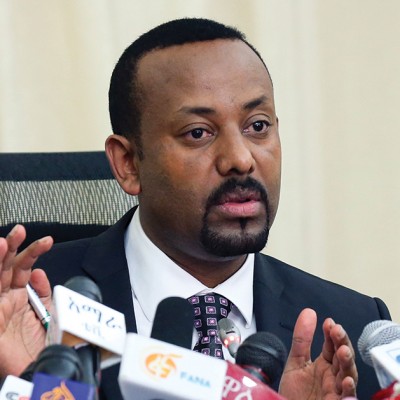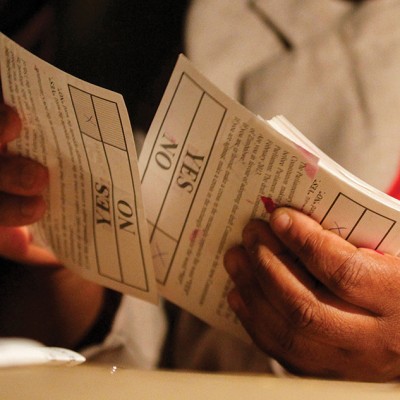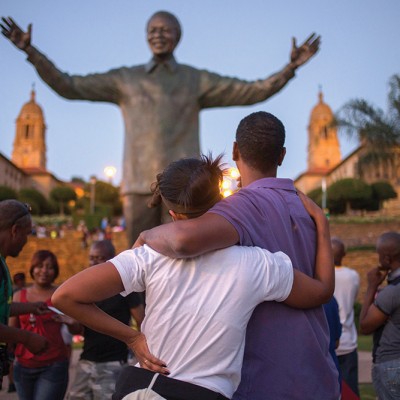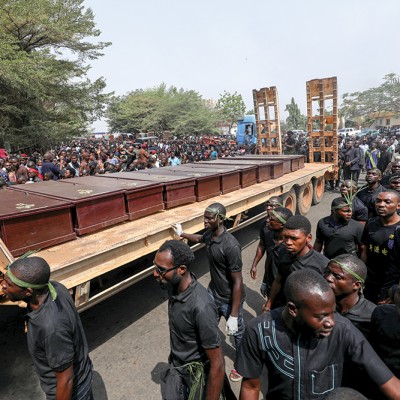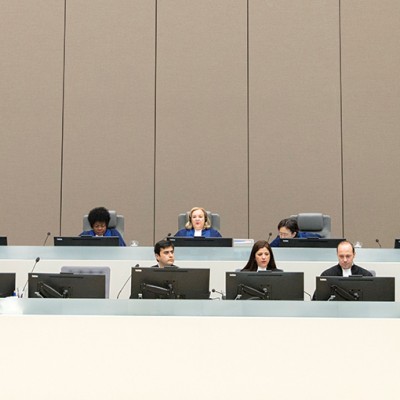Introduction
Since the return to democracy in 1999, Nigeria has been grappling with diverse security challenges, chief among them are insurgency, election violence, kidnapping and most recently, the herder-farmer conflicts among others. The north central states of Benue, Plateau and Nasarawa and other states have experienced conflicts that led to thousands of deaths and displacements as a result of clashes between pastoralists (herders) and local farmers in several communities. In January 2018 alone, Amnesty International reports indicate that 168 people were killed as a result of herdsmen-farmer clashes.1
Struggle over grazing land and scarce resources have over the years resulted in perennial and growing violent conflicts in terms of frequency, intensity and geographic scope. Underpinning the escalation in frequency of conflicts in Nigeria is a confluence of environmental and demographic forces, especially desertification caused by climate change and population explosion. Expectedly, with the depletion of arable land for subsistence farming largely as a result of increasing urbanisation and the adverse effect of climate change, especially along the Lake Chad basin, there is increased struggle between herdsmen and farmers – leading to violent confrontations and conflicts, deaths and forced displacement, as well as the destruction of agriculture and livestock. The persistent attacks in Benue state have had a spill-over effect on the neighbouring state of Nasarawa. In January 2018, the News Agency of Nigeria reported that over 18 000 internally displaced persons (IDPs) were in 11 camps in Nasarawa state.2
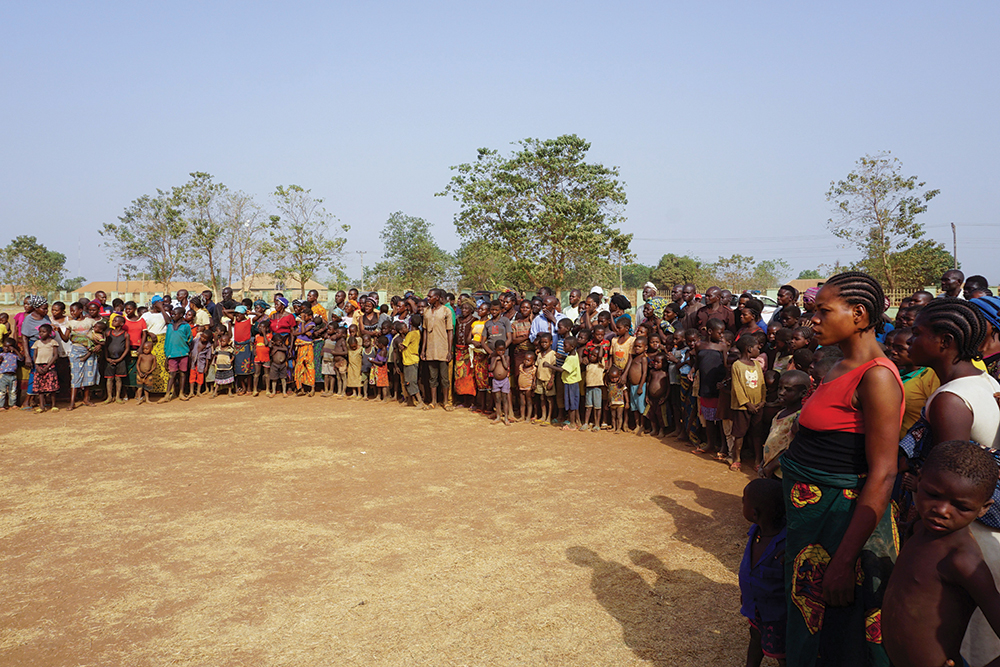
A major cause for the escalating intensity of the conflict is the increasing proliferation of small arms and light weapons in Nigeria. Given that host communities (including farmers) also have access to sophisticated weapons, minor disagreement or provocation often degenerates into violent clashes, resulting in widespread destruction of property and human casualties.
This article interrogates the theoretical underpinnings of the conflict and analyses the trends and dynamics of the conflict. Recommendations are proffered to end the incessant herder-farmer conflicts, and by extension halt the killing and displacement of people.
Theoretical Underpinnings
There are many theoretical explanations for the causes and nature of the herder-farmer conflict in Nigeria. The conflict is best described with the use of social conflict theory. The theory sees social life as a competition and focuses on the distribution of resources and power which are not evenly endowed by nature. Proponents of the theory view society as a gathering of people of diverse needs and interests with limited resources to meet their needs. This creates inequality that generates social conflict and social change. Karl Marx is considered the father of social conflict theory.
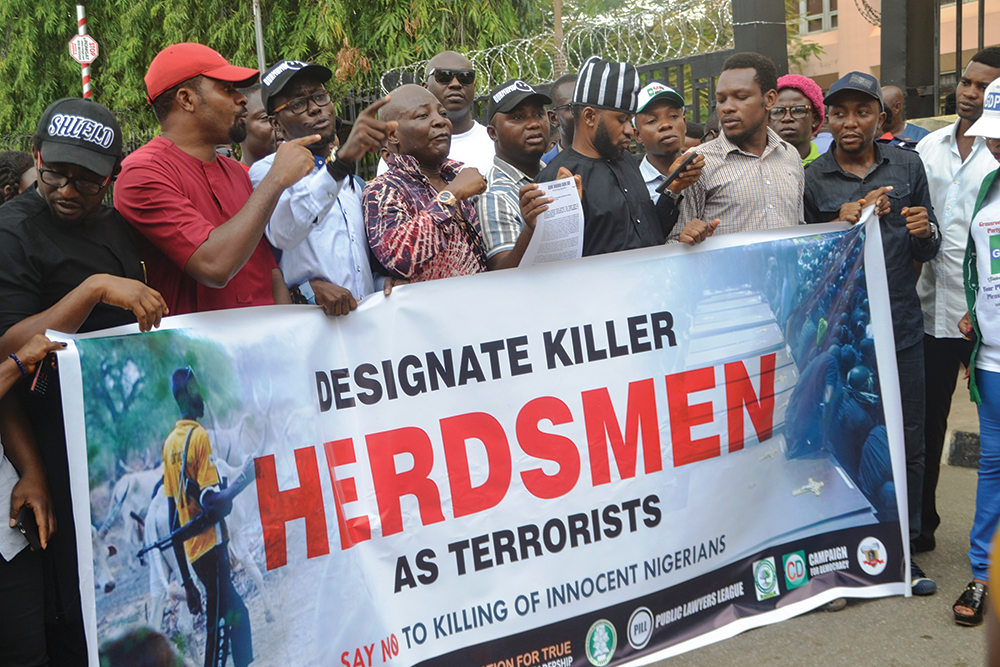
Social conflict theory basically looks at struggles for power and control in society as a major causal factor of conflict. Conflict occurs when two or more actors oppose each other in social interaction, reciprocally exerting social powers in an effort to attain scarce or incompatible goals and prevent the opponent from attaining them. The quest for dominance and power becomes the currency rather than consensus. Based on this premise, governments at local, state and federal levels have not been able to address the contending issues between herdsmen and farmers or assist them in reaching some consensus.
Overview of the Conflict
The movement of herdsmen and subsequent clashes with farmers and host communities in recent times has heightened insecurity in Nigeria, particularly in the North Central region and by extension in other parts of the country. The driving force of the clashes is the competition for available resources, especially grazing land. It seems that the government has abandoned the grazing reserve system created by the Northern region government in 1965. Then, the government created over 417 grazing reserves in the north.3 Under the grazing reserve system, government provided space, water and vaccinations for the livestock while the herdsmen paid taxes to the government in return. However, the discovery of oil and subsequent exploration and export made Nigeria an oil economy, particularly in the 1970s and 1980s. Subsequently, the grazing reserve system was abandoned due to the neglect of the agricultural sector as the mainstay of the country’s economy.
Consequently, grazing reserves which were under a neglected agricultural sector could not be sustained. It received little or no attention from succeeding administrations. As a fall-back, herdsmen began to resort back to their traditional and seasonal grazing routes which had been interrupted or interfered with by industrialisation, urbanisation, demographic and other natural factors. This then led to clashes and conflict with farmers and host communities. These conflicts have been on the increase in recent times and now constitute one of the major threats to Nigeria’s national security.
To address these challenges, the Federal government in June 2015 constituted a Strategic Action Committee to look into the issue and make recommendations that would help government address the problem. A major stakeholder in this effort, the umbrella body in the cattle rearing business, the Miyetti Allah Cattle Breeders Association (MACBAN), agreed that the effect of climate change and desertification was a major causal factor leading to trans-human movement from North to the South annually.4 Since climate change and other associated factors are beyond what farmers or herders could address, there is need for concerted efforts by the government, private sector, regional bodies and the international community at large to come together to address these challenges.
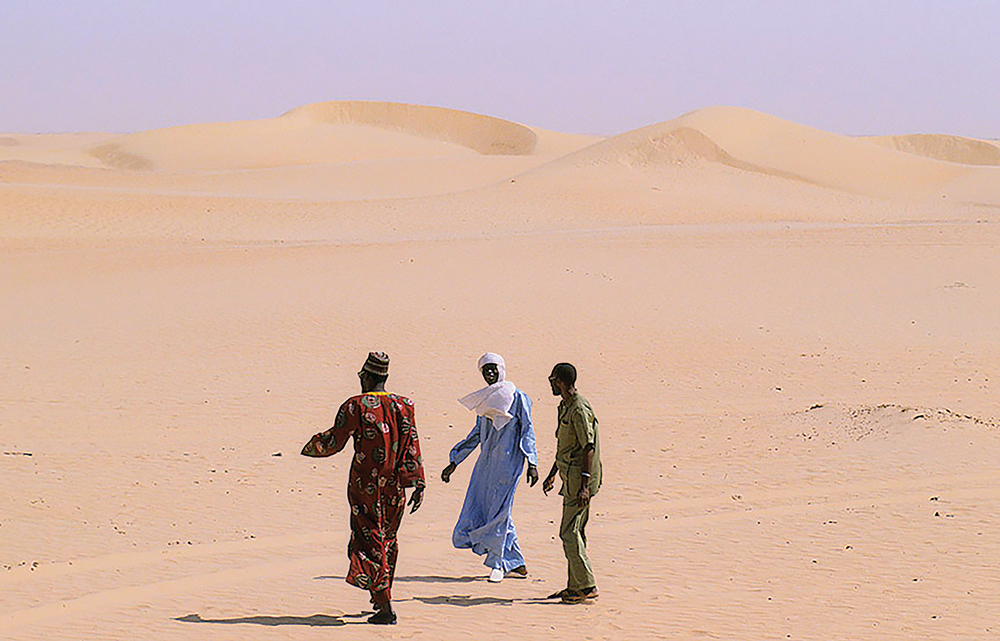
Triggers and Enablers to the Conflict
There are a number of factors that combine to escalate the conflict among the identified actors. Some of these include: climate change and environmental degradation, depleting arable land for farming, and lack of political will to tackle the challenges.
Climate Change
Climate is a critical factor in the activities of herdsmen and farmers. The changing climatic condition, generally referred to as global warming, is no doubt taking a toll on the survival of herdsmen and farmers business. The desert encroachment from the Sahara towards the Sahel region and other associated climatic conditions have continued to affect the livelihood of herdsmen as they push further south in search of available space, pitching them against farmers and host communities. This global phenomenon is currently affecting many parts of the world with attendant consequences – including the herdsmen-farmer conflict.
Depleting Space for Farming
Constant urbanisation and demographic shifts in the present day world has increased the tendency and likelihood of farmers to move further afield for farming activities. At independence in 1960, the Nigerian population stood at about 35 million people.5 However, 58 years later, it has leaped to over 180 million people and the growth is expected to persist in the near future.6 Population increase of this magnitude also means a geometric increase in the demand for food products as a basic human need. This also implies an increase in the quest for farming space for farmers. Conversely, industrialisation and urbanisation have continued to claim all available land, leaving little or nothing for farmers’ survival. The continued movement of herdsmen southwards in search of pasture for their animals has pitched them against farmers, eventually leading to conflict and destruction. For example, farming along the Benue River accounts for over 20 000 tons of grain annually.7 This same area is also fertile ground for herdsmen to feed their cattle. Thus, farmlands within the river bank areas are the most affected by the movement of the herdsmen – resulting in a number of clashes.
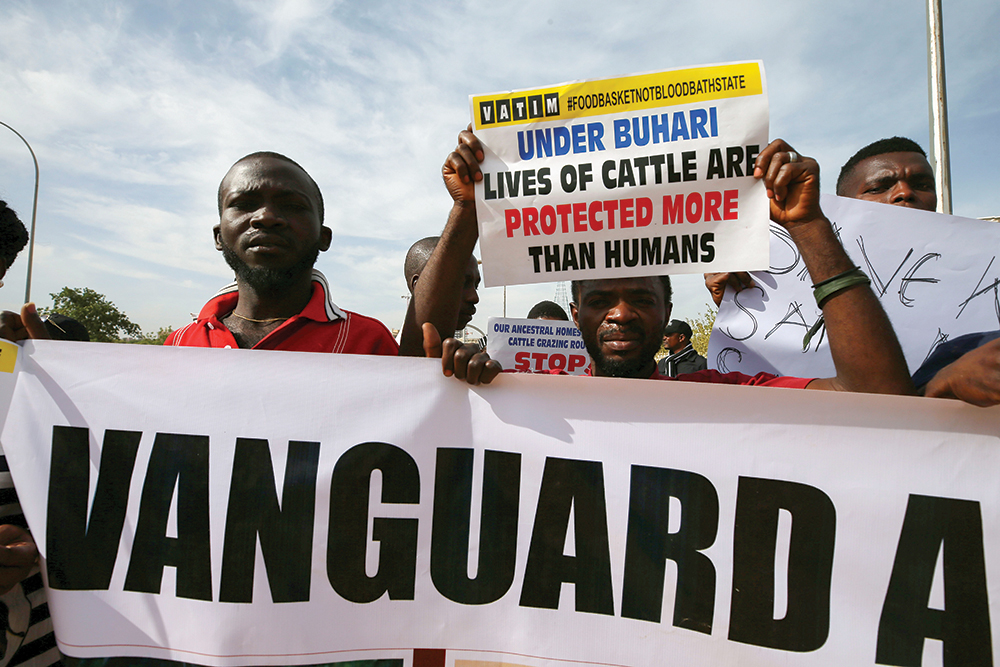
Lack of Political Will
The government at all levels has demonstrated near absence of needed political will to proffer lasting solutions to the conflicting claims of different actors in the ongoing conflict between the herdsmen and farmers. Political leaders have failed to invoke appropriate legislations to be backed by action that would define rules and limits for parties involved in the conflict. At the regional level, the Economic Community of West African States (ECOWAS) has a Protocol on Trans-human Movement, though the framework is yet to be fully implemented at national levels. Lack of political will remains a hindering factor among member states. Political will to implement this protocol and other frameworks remains an enabler to the conflict. The Federal government, in the past, has made efforts to regulate and control pastoral activities, but it appears that adequate political will is needed to enforce laws. For instance, the government is perceived from some quarters, especially by opposition parties, as being sympathetic to the activities of the herdsmen. This perception is likely due to the fact that the President is Fulani, the same ethnic group that dominates the cattle business. Citizens, especially from the most affected states expected the federal government to deal with the herdsmen-farmer conflicts in all parts of the state with the same vigour and determination it showed in similar internal security issues in other parts of the country.
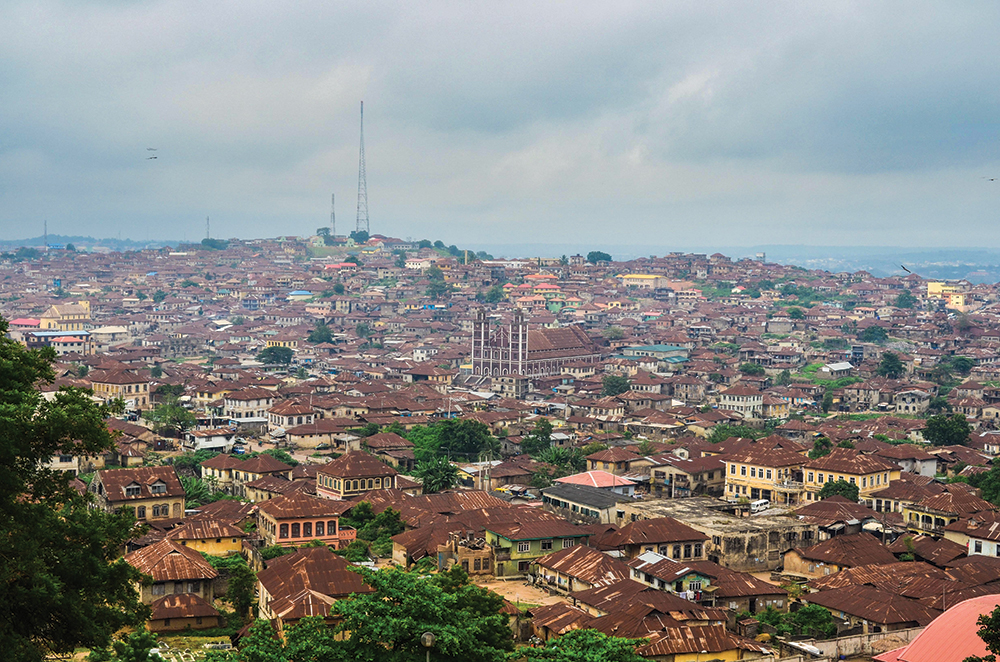
The Government’s Strategic Response to the Herdsmen-Farmer Conflict
- Creation of Grazing Reserves in 1965. In 1965 the northern regional government initiated one of the first attempts to respond to the herdsmen-farmer conflict in the country.8 The grazing reserves allocated large portions of land to be exclusively used by herders to rear their livestock. However, the grazing reserve system was not supported adequately. The government was still in the process of initiating legislations to legitimise the grazing reserves before natural factors such as population growth and other related consequences like urbanisation, and migration encroached on these designated areas reducing the herders’ chances of accessing the reserves.
- Establishment of the National Commission for Nomadic Education (NCNE) in 1989. The federal government in 1989 established the NCNE and it is supported by the Nigerian legal system. The main goal of the programme was to integrate nomadic pastoralists into national life through mobile basic education and skill acquisition. The programme intended to integrate them into society through education.
- The Use of the Armed Forces to Curb Internal Security. One of the Federal government’s immediate measures to address the herdsmen-farmer conflicts is the engagement of the Armed Forces of Nigeria as enshrined in the Constitution.9 For example, in Plateau state, in 2001, the government deployed a Special Task Force called Operation Safe Haven (STF-OSH) to check insecurity resulting from the herdsmen-farmers clashes. Recently, the OSH mandate was expanded to replace Operation Harbin Kunama II in Southern Kaduna state whose mandate was similar to that of OSH in Plateau.10 Presently, many are calling for a total declaration of a state of emergency in Benue and Plateau states as a result of the gruesome killing and displacement of thousands of people in those states. Nigerians also expect the government to activate all the necessary sections of the constitution regarding the use of the military in internal security. This call came as a fall-out of recent action taken by the government to suppress the Indigenous People of Biafra’s (IPOB) agitations in the South-East and similar uprisings in other parts of the country. The military was deployed in September 2017 in an operation code-named Operation Python Dance to suppress the IPOB agitation and protests.11
- Establishment of the National Grazing Reserve Bill 2016. A National Grazing Reserve bill was sponsored in 2016 at the parliament to address the herdsmen-farmer conflicts. The Bill did not survive due to opposition from different stakeholders. Those that opposed the Bill hinged their rejection on the provisions of the Land Use Act of 1978 which vests all powers related to the regulation of ownership, acquisition, administration, and management of Nigerian land with the state governors.12 Thus, the Land Use Act is an Act of the National Assembly, and by implication, a binding legislation, unless it is amended. State governments and their representatives at the parliament have always opposed any attempt to establish grazing reserves in their domain. They consider it to be usurping the constitutional powers vested in them.13
- Proposed Cattle Ranching System 2018. In reaction to increasing conflicts and mass killings resulting from seasonal pastoral movements, the government in 2018, as a matter of policy approved a 10-year National Livestock Plan at a cost of about 179 billion naira. The plan would culminate in the establishment of 94 ranches in 10 pilot states of the federation.14 Again, state governments, especially in the South and North Central areas rejected the proposal on the grounds of not having enough space for such projects.
- Legislation Prohibiting Open Grazing. As part of measures to end the persistent conflict between herdsmen and farmers in various states, government at state levels began enacting legislations prohibiting open grazing in their state. This, they hope, would reduce the risk of herdsmen destruction of farm lands and the associated conflicts. Benue, Ekiti and Taraba states are leading this opposition by enacting state laws prohibiting open grazing. On 22 May 2017 Benue state enacted the Open Grazing Prohibition and Ranches Establishment Law (2017)15 and its implementation began on 1 November 2017.16 Ekiti and Taraba states have also signed Bills prohibiting open grazing in their states. This makes open grazing under any guise, an illegal activity punishable by law.
- The Great Green Wall Agency of the Federal Government. In 2013 the Federal government established the Great Green Wall Agency to tackle desertification. This was in response to the 2007 African Union Great Green Wall Initiative that aimed at encouraging member states to plant 8 000km of trees along the Southern Sahel to counter the effects of desertification along that area. Continued desert encroachment along the Sahel region as a result of climate change is a major factor responsible for seasonal migration of herdsmen from one region to the other in search of water and vegetation for cattle grazing.

Recommendations
- The Federal government of Nigeria should deploy a Joint Task Force comprising military, police, paramilitary and civil institutions to all the affected states as an immediate response to the conflict. This will help restore law and order and build confidence of the general populace in the ability of the government to respond to threats. The military could be deployed to the conflict zones to create safe and secure environments peaceful enough to inject long-term strategies for ending the conflict and engaging in peacebuilding.
- There is a need to encourage community policing leveraging on the already existing vigilante system in most states. Community policing will help in intelligence gathering about the conflict while civil police would respond to such threats. This will help address the challenges of waiting for the federal government to deploy security to states when there is conflict.
- The Federal government should revisit the 1965 Northern Region Government’s Grazing Reserve System and remodel it to deal with contemporary threats. The grazing reserves and live-stock routes have also been encroached by farmers and the activities of urban developers. The abandoned grazing reserve system operated in the 1960s has to be revisited.
- The Federal government should vigorously pursue a holistic campaign that will seek the support of all actors, including herdsmen, farmers, state and local governments, to accept the idea of modern ranching as an alternative to traditional migration of herders which causes friction and other associated threats.
Conclusion
The herder-farmer conflict has become more significant in the last two years. Although the government had in the past taken some measures to address this phenomenon, the increasing desertification and the effects of climate change have further increased the drive for the herdsmen to move further south in search of grazing land and pasture for their livestock. These southward movements always pitch them against farmers and the host community whose crops are regularly invaded and destroyed by the cattle during this seasonal movement. The result of this is increased conflict, death, displacement and the total destruction of properties. However, because the phenomenon is a human security issue, there is a need for a concerted effort at state, national, regional and international levels to address the challenges, especially since there is no specific legislation that is dedicated to addressing the peculiar needs of herders and farmers in the country.
Endnotes
- Godwin, Ameh (2018) Amnesty International Reveals How Many Nigerians Fulani Herdsmen Killed in 2018’ Daily Post News of 30 January 2018. Available at: <http://dailypost.ng/2018/01/30/amnest-international-reveals-manynigerians-fulani-herdsmen-killed-2018> Accessed on 7 July 2018. Duru, Peter (2016). 10,500 Persons Displaced in Herdsmen Farmers Clash in Nigeria. Vanguard online Newspaper, 29 February 2016 Available at: <http://www.vanguardngr.com.html> Accessed 6 June 2018.
- Mercy Corps (2015) The Economic Costs of Conflict and the Benefits of Peace: Effects of Farmers-Pastoralist Conflict in Nigeria’s Middle Belt on State, Sector, and National Economies. Available at: <mercycorps.org/sites/default/files/Mercy20Nigeria20State20Costs20 Conflict20Policy20Brief20July202015.pdf.> Premium Times, (2018). ‘Benue Killings: Over 18,000 Persons Displaced in Nasarawa – Official’. Premium Times News of 11 January, 2018. Available at: <https://www.premiumtimesng.com/regional/north-central/255223-benue-killings-18000-persons-displaced-nasarawa-official.html> Accessed 7 July 2018.
- Bello, Muhammed (2015) ‘How to Solve the Fulani Herdsmen Versus Farmers Clashes in Nigeria by MIYETTI Allah’, Premium Times Online Newspaper, 14 October 2015 Available at: <http://www.premium-times-ng.com.html> Accessed 13 December 2017.
- Ibid.
- Mbachu, Ozoemenam (2008) Foreign Policy Analysis: The Nigerian Perspective. Kaduna: Joys Graphic Publishers, pg 45–70.
- Nana, Tanko (2017) ‘Population Demographics and National Development in Nigeria’. Paper Presented at the National Defence College Abuja on 26 September 2017 for Participants of Course 26.
- Abah, Roland Clement and Petja, Mareme (2015) The Socio-economic Factors affecting Agricultural Development in the Lower River Benue Basin. Journal of Biology, Agriculture and Healthcare 5 (24).
- Peace and Security Forum (2017). Resolving the Herders/Farmers Conflict in Nigeria, Policy Brief.
- Federal Government of Nigeria (1999) Constitution of the Federal Republic of Nigeria.
- Agande, Ben (2017) ‘Army Launches Operation Harbin Kunama II in Southern Kaduna’. Vanguard News. Available at: <https://www.vanguardngr.com/2017/04/army-launches-operation-harbin-kunama-ii-southern-kaduna/> Accessed 17 June 2018.
- Indigenous People of Biafra (IPOB) is a pressure group that believes in the actualisation of the state of Biafra in eastern Nigeria. The Federal government, through the armed forces, blacklisted the group as a terrorist group due to its activities. In September 2017 Operation Python Dance was deployed to suppress the activities of the group.
- Land Use Decree (1978) No. 6, Cap 202. Laws of the Federation of Nigeria.
- Kwaja, Chris M.A and Ademola-Adelehin, Bukola I. (2018) Response to Conflicts between Farmers and Herders in the Middle Belt of Nigeria: Mapping Past Efforts and Opportunities for Violence Prevention. Search for Common Ground. 8.
- Alli, Yusuf (2018) ‘Fed Government to build 94 ranches in 10 states’ The Nations News, 20 June 2018 Avaliable at: <http://thenationonlineng.net/fed-govt-to-build-94-ranches-in-10-states/> Accessed on 17 July 2018.
- Channels TV report (2017) ‘Benue Governor Signs Bill Prohibiting Open Grazing Into Law’ Channels TV, 22 May 2017. Available at: <https://www.channelstv.com/2017/05/22/benue-governor-signs-bill-prohibiting-open-grazing-law/> Accessed on 20 July 2018.
- Kwaja, Chris M.A. and Ademola-Adelehin, Bukola I. (2017) The Implications of the Open Grazing Prohibition and Ranches Establishment Law on Farmer-Herder Relations in the Middle Belt of Nigeria: Search for Common Ground research on Implication of Open Grazing Prohibition Law on Farmer-Herder Relations, December 2017.
- Ranched cattle have been proven to be better, in terms of the quality of milk products and the meat than the traditional cattle rearing system that is more expensive and risky to maintain.

